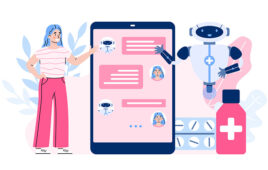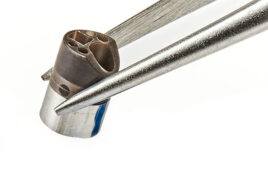
(Credit: Stock)
Tech is transforming almost every aspect of modern life for women and helping them acquire a deep insight into their body health – from fertility trackers to wearable health tech – but the Femtech revolution will only flourish when there is high quality, large-scale clinical data that demonstrates the product works, and when the regulatory framework can evolve to accommodate new trends, claim Femtech pioneers Natural Cycles who, in February 2017, became the world’s first, and only, health app to be certified as a contraception for women with no side-effects.
“Femtech and, in particular, contraception is great for start-up businesses because pharmaceuticals have retracted from innovating in that space, which leaves a void that a new generation of entrepreneurs can fill and create sustainable businesses doing so,” says Dr. Elina Berglund, co-founder and CTO Natural Cycles, who was part of the Nobel prize-winning team that discovered the Higgs boson.
Three to four years ago Femtech did not exist, now you can use an app for contraception. Wearables are booming in the start-up sector and changing the way women interact with their bodies and self-manage their health.
“Just like the boom in the fitness and health food industry women are seeking alternative ways that support their health values and body insight. Contraception has been at the forefront of feminism allowing women to make conscious decisions about their future, and Femtech is evolving this space,” Dr. Berglund adds.
There are barriers to the Femtech revolution, however, but these can be overcome. One major obstacle is the need for solid empirical evidence, underpinned by high quality and large-scale clinical data, to demonstrate that the product works. This point is significant and considered to be a vital asset for any brand working in Femtech. Sufficient resources need to be invested in high-quality clinical studies, which will serve as the basis for submission, approval, certification and marketing of a product. The review and approval of new Femtech products by regulatory agencies is dependent upon a trust that the clinical data presented has sufficient integrity to instil confidence and positive conclusions.
“Obtaining more research and large-scale clinical data to put a product on the market is critical to the success of the Femtech revolution,” adds Dr. Raoul Scherwitzl, co-founder of Natural Cycles.
“The law must be able to evolve and adapt to placing Femtech products, like apps, within the regulatory framework, otherwise market access will be denied and tech innovation will stall – and that’s problematic. In 2016 our large-scale clinical study* demonstrated that Natural Cycles was effective for contraception, yet the law was ambiguous as to how to go about regulating an app for contraception – the fundamental question was whether the app was a contraceptive or an information tool that advises users when to use contraception,” he adds.
“If a product is not backed up by solid clinical data or medically regulated, e.g. has no valid CE mark, then it is not considered safe so why should women trust it?,” asks Dr. Berglund. “Trust is vital to tech innovation. We know we’re dealing with women’s lives here and we take that very seriously. It’s proof to all women out there that properly regulated and certified tech, that is underpinned by quality clinical studies, is a valid choice – just as it is to take the pill every day or insert an IUD to prevent a pregnancy,” she adds.
The current Femtech space means that information, for example the data produced by Natural Cycles smart algorithm to inform women if they are fertile or not on a particular day, can have a similar impact or intended use as a drug.
As a result, the regulatory framework needs to evolve and adapt to this trend.
“We’re championing a Femtech world where tech could represents the next era in women’s health”, says Dr. Berglund. “Tech and information is the future of women’s health and contraception, but quality clinical studies and the evolution of a regulatory framework is paramount. Better insight means women can be empowered to take control and self-manage their health, fertility and future with more choice,” she concludes.
The Femtech revolution will help to redress the number of women in tech, still hugely underrepresented in this sector (women made up 14.4 percent of the workforce in STEM industries in 2015) but interest amongst women for the products produced for them is increasing because women who understand the needs of these companies can identify with their products are, of course, more likely to work for that company. “It is a lot more fun to work for something you believe in, but there is a big gap to fill in the STEM sector and the Femtech revolution will make those positions more appealing to women,” says Dr. Berglund.




